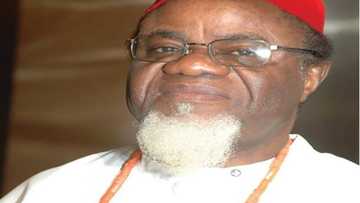Hausa Language Missing as Young Africans Build App That 'Speaks' Igbo, Yoruba, Other African Languages
- Young Africans living in the United States have created an app that 'speaks' more than 15 African languages
- They united under a common bond to make it easier for other Africans to learn and translate any language of their choice into any African country
- But they say the snag has remained funding to scale the app and add more languages which will help the future generation
PAY ATTENTION: Click “See First” under the “Following” tab to see Legit.ng News on your Facebook News Feed!
Young Africans, including Nigerians living in the United States of America, have built Mandla, an app that can 'speak' almost all the languages on the African continent but has excluded one of the most spoken languages in Africa - Hausa.
Wenitte Apiou, from Burkina Faso and Boluwaji Odufuwa, a Nigerian both nursed the idea of preserving African languages and decided to build an app where people can learn or translate other languages into any language in Africa.

Source: Facebook
PAY ATTENTION: Subscribe to Digital Talk newsletter to receive must-know business stories and succeed BIG!
How it started
Born in Burkina Faso, Apiou went to the US when he was just five years, while Odufuwa was born in Nigeria and also moved to the US at a young age. The duo bonded because of their African heritage and started building the app, according to TecCabal.
According to Apiou, he is only versatile in French besides the English language and found it hard communicating with older family members who could speak neither French nor English.
Apiou said:
“The only language I’m fluent in besides English is French, which makes it difficult to communicate with some of my older family members who never went to school and were not able to learn French fluently,” Apiou told TechCabal in an interview. “It’s harder being in the United States as well. The only people that can help would have been my parents, and they did not speak those languages in the house.”
A diverse team
Emeka Ezike and Delanyo Mensah also joined the team later and started working on the web version of the app.
Apiou further said they brought a number of smart young Africans to join in the effort—a few engineers and Delanyo, who’s passionately pushing their growth, especially on TikTok where they have a bunch of audience.
The platform has more than 15 African languages and counting including Yoruba, Igbo, Ghana’s Twi language, Ethiopian's Amharic and East Africa’s Swahili on its platform.
Apiou said the goal is to continue to add other languages until the entire African continent is covered.
challenges
The app is currently growing organically and, according to Apiou, it has 5,000 registered users pegged at about 50 signups per day and about three to 400 daily active users.
The team wants to scale their technology and build a more powerful marketing strategy, from organic to paid but they are restricted by funding. Apiou said they’ve reached out to several investors without any success.

Read also
2023 presidency: We are ready to kneel to get support from other regions for Southeast, Ezeife reveals
The team the app as an innovative, black-owned e-learning language app created for those who seek to strengthen their unbreakable connection with their African roots.
African founders losing employees to American investors
Meanwhile, Legit.ng reported that African startups are losing their talents to big tech companies and this is affecting their operation and growth. Big tech companies consist of foreign companies like Facebook, Amazon, Google, Twitter, Microsoft, Stripe and more.
These companies are offering employees of African tech startups the chance of relocating from Africa or earning in dollars - African founders are finding it difficult to compete against these incentives.
This was stated by tech investor, Victor Asemota, who said big tech interest in African talents has become a systemic problem that is affecting everyone, stating that the pandemic played a role in opening the door for talent poaching.
Source: Legit.ng




